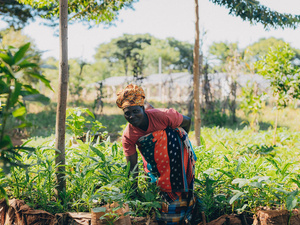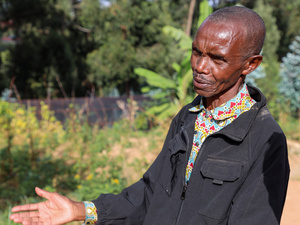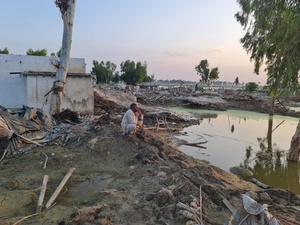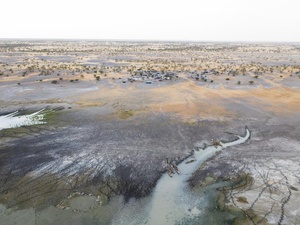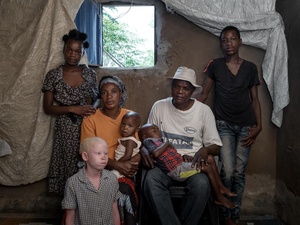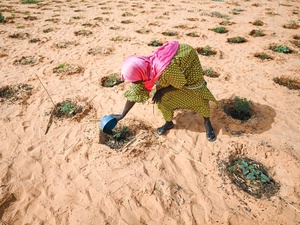Climate change has hit South Sudan hard – here's how UNHCR is responding
Climate change has hit South Sudan hard – here's how UNHCR is responding

Members of the Old Fangak Dyke Committee reinforce a communal dyke damaged by flooding in South Sudan. UNHCR supports the group by providing tools to build and maintain dykes. Instances of flooding in the Fangak area are increasing in frequency and severity, with the most serious in living memory in the past three years. Residents face serious challenges such as shortages of food and basic items.
Climate-change driven floods are now impacting about one million people in South Sudan every year, aggravating an already precarious situation for one of Africa’s most fragile and conflict-affected countries.
In other parts of the country, many more people have been tipped into food insecurity as droughts have killed livestock and disrupted crop cycles. To escape both flooding and drought, pastoralists have moved their animals far beyond the traditional transhumance routes, bringing them into fierce conflict with sedentary communities, including South Sudanese who have recently returned home from exile.
“We see how some of the most vulnerable people are impacted by this global problem, yet their contribution to the causes of climate changes is minimal,” says Arafat Jamal, UNHCR’s Representative to South Sudan, “We cannot wait for a dire situation to get worse. We had to take action.”
Here are the steps UNHCR, the UN Refugee Agency is taking in South Sudan:
- In inundated areas of north-eastern Unity State, UNHCR is supporting the construction of flood resilience infrastructure such as dikes and drainage systems. Additionally, it is providing an early warning system and seasonal climate information to refugee farmers and other people of concern.
- To manage severe floods in Old Fangak, a town at the epicenter of last year’s flooding that is almost entirely submerged, UNHCR has formed dike care maintenance committees and provided training and tools, including plastic sheets, hoes, spades, and sandbags, to help strengthen flood defenses. UNHCR is also supporting displaced families in Malakal and other towns.
- Working closely with UNMISS, UNHCR has embarked on a series of peace initiatives in Eastern Equatoria in order to avert further conflict between herders and farmers, and to encourage the pastoralists to return to their areas of origin.
- As part of its Sustainable Livelihoods Strategy for 2022-2025, UNHCR is providing flood tolerant seeds and skills training to affected people in inundated areas.
- For those hit by drought, UNHCR is distributing early maturing and drought-resistant seed varieties, as well as supporting the introduction of irrigation systems.
- To support re-forestation, UNHCR has set up tree nurseries to produce and distribute seedlings in Jamjang, Maban and Yambio.
- In Jamjang in Ruweng Administrative Area 583,560 seedlings were produced between 2016 and 2021. In 2022, there is a plan to produce 75,000 seedlings of which 57,000 have already been produced, with 52,930 seedlings already distributed.
- In Maban, UNHCR established five tree nurseries in four refugee camps through its partner, Relief International. Together they grew 103,902 tree seedlings in 2021, 69,745 of which were planted in community managed wood lots to fill gaps and replace cut trees.
- In Yambio, in Western Equatoria state, UNHCR has distributed a total of 15,766 tree seedlings.
Furthermore, as part of a strategy to boost access to clean energy and cut greenhouse gases emissions, UNHCR has:
- Produced 9,648 high-efficiency cooking stoves over a period of eight months in 2021, for refugees in three refugee camps in Maban.
- To replace firewood and charcoal, refugee women and their host community in Maban are turning agricultural waste into clean-burning briquettes in a pilot project that saves trees and provides an income.
- To curb greenhouse gases, UNHCR has solarized 30 per cent of its water boreholes in Maban’s refugee camps, reducing about 1,420 tons of CO2 emissions per year.
As the world marks this year’s World Environment Day with the theme of “Only One Earth, Time is Running Out”, South Sudan must not be forgotten as it is where for many people, time has already run out as the places they have called home become uninhabitable due to climate change.
ENDS
For more information on this topic, please contact:
Charlotte Hallqvist [email protected] +211 92 1101 2000
Tim Gaynor [email protected] +211 912 349 879
Mary-Sanyu Osire [email protected] +211 90 211 01 2118



